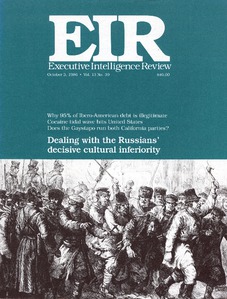Departments
Africa Report
by Mary Lalevée
The World Bank Markets Genocide.
Report from Bonn
by Rainer Apel
Reluctance in the War on Terrorism.
From New Delhi
by Susan Maitra
The Buddhist Factor in Sri Lanka.
Dateline Mexico
by Josefina Menéndez
Televisa and Presidential Hopefuls.
Andean Report
by Valerie Rush
To Spray or Not To Spray
Report from Rio
by Silvia Palacios
Moscow Loves Brazil.
Editorial
DuPont and American Law.
Interviews
Interview: George Cavin
by Marjorie Mazel Hecht
A retired U.S. Department of Agriculture entomologist, recently in Mali as part of a U.S. Agency for International Development team, describes the effort to stamp out the locust plague.
Operation Juárez
Ibero-America’s Debt: It’s 95% Illegitimate
The fifth installment of the book that is making headlines in Mexico, Venezuela, and Panama, Ibero-American integration: 100 Million New Jobs by the Year 2000. EIR’s exclusive English serialization begins Chapter 2.
Science & Technology
Fusion Reactor Technology
by Dr. V.K. Rohatgi
The concluding part of Dr. V.K. Rohatgi’s overview of the state of fusion research and the requirements for fusion reactor construction.
Economics
IMF in Brawl over Future of Dollar Empire
by David Goldman
If the Germans and Japanese agree to America’s terms, a generalized financial collapse will likely be postponed until sometime in 1987. Otherwise ...
Cocaine Production Far Exceeds U.S. Government’s Calculations
by Ricardo Martín
A unique study by former Peruvian special prosecutor Ricardo Martín.
Locust Disaster: Schiller Institute: Africa Needs More Big-Plane Spraying
Currency Rates
Isolate AIDS Ill, Says M.D. in Norway
Agriculture
by Marcia Merry
The New Class of Farmer-Paupers.
Banking
Texas Banks Ready To Crash.
Medicine
by John Grauerholz, M.D.
Drug May Help Some AIDS Patients.
Business Briefs
Feature
Dealing with the Russians’ Decisive Cultural Inferiority
by Lyndon H. LaRouche, Jr.
Suppose that over the relatively short term ahead, a peace-through-strength posture by the U.S.A. and its collaborators, has halted the Soviet empire’s active aggression. How can we win irregular warfare against that empire? Lyndon LaRouche answers in a major new policy paper: “Exclusive emphasis upon methods of internal subversion of nations falling into the classes of Russia or mainland China, can not lead to a net success. Only by inducing a crisis of felt cultural inferiority within such nations, can the conditions for the needed cultural shift be induced.”
International
Reagan Shakes Soviet Leaders with Proposal To Share SDI
by Kathleen Klenetsky
In his UN speech, the President reported publicly that the cornerstone of the American proposals is joint U.S-Soviet deployment of a strategic defense system that would protect both countries and their allies from nuclear attack.
France Rallies Support against Soviet-Sponsored Terrorism
by Thierry Lalevée
Terror Command Ran Danish House Riots
by Poul Rasmussen and William Engdahl
An exclusive report from Copenhagen.
Alan García: ‘Peru’s Terrorists Are the Anti-Christ’
by Mark Sonnenblick
Venice Plays Host to ‘the Third Rome’
by Mark Burdman and Rachel Douglas
International Intelligence
National
LaRouche Presidential Landslide Projected
by Patricia Salisbury
The hectic scramble against California’s Proposition 64, which proposes to make AIDS a reportable communicable disease, seems designed to help the controversial Democrat’s candidacy in 1988.
The Gaystapo in the California GOP
by Ira Liebowitz
The bi-partisan opposition to the AIDS ballot initiative exposes the homosexual lobby’s control of both parties.
More British Medical Experts Back Prop 64
Democrats Pro-Defense? Emperor’s New Clothes
by Kathleen Klenetsky
Eye on Washington
by Nicholas F. Benton
“Who Lives, Who Dies” When Budget’s Cut?
Congressional Closeup
by Kathleen Klenetsky and Ronald Kokinda
National News



